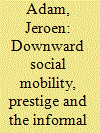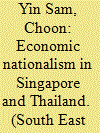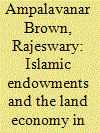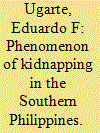|
|
|
Sort Order |
|
|
|
Items / Page
|
|
|
|
|
|
|
| Srl | Item |
| 1 |
ID:
085890


|
|
|
|
|
| Publication |
2008.
|
| Summary/Abstract |
The historiography of Malay cultural production has a number of blind spots. In the case of the stamboel theatre and its related forms, this article addresses three of them: first, the transformation process from popular performing traditions to modern Westernized theatre, with a focus on individualization and intellectualization; second, the generally underrated or even negated contribution of Sino-Malay intellectuals/artists to that process; and third, the productive interweaving of the modern media of film, theatre and literature. The theoretical concept of the dispositif, in tandem with two concrete case studies - the highly successful stamboel ensembles Miss Riboet and Dardanell - will help circumscribe the adjustments required in the modernization process. Within this framework, the relevance of situational elements and the technical apparatus, altering modes of perception, the cultural phenomenon of stardom and the negotiation between oral stage productions and printed play scripts are discussed. All these aspects are brought together in a contextualization and evaluation of the early forms of modern Malay theatre and its contribution to the development of modern Indonesian culture.
|
|
|
|
|
|
|
|
|
|
|
|
|
|
|
|
| 2 |
ID:
085889


|
|
|
|
|
| Publication |
2008.
|
| Summary/Abstract |
This article illustrates how a religious conflict that started in 1999 on the island of Ambon in combination with an overall Indonesian financial crisis brought about the downward social mobility of many autochthonous Ambonese. In particular, the Ambonese employed in formal waged labour were forced to take up income generation strategies in insecure, informal economic sectors, which before the conflict had been dominated by the lower-class Muslim migrant community. This process was further encouraged by the spatial transformation during which these Muslim migrants became locked up in Muslim areas and Christian Ambonese took over their businesses in the Christian parts of the island. In a similar vein, the flight of many ethnic migrants to places outside Ambon stimulated Ambonese Muslims to penetrate these informal economic sectors in the Muslim parts of the island. As autochthonous Ambonese do not want to leave these jobs even since the violence has ended, competition at the lower-class bazaar level of the economy has vigorously intensified.
|
|
|
|
|
|
|
|
|
|
|
|
|
|
|
|
| 3 |
ID:
085888


|
|
|
|
|
| Publication |
2008.
|
| Summary/Abstract |
Economic nationalism is often associated with the mercantilist view. Being nationalist is viewed as non-conventional, particularly in the age of globalization in which cross-border trade and investment are perceived to bring benefits to all participants. The paper questions this notion of economic nationalism. The author argues that in today's context, policy changes that appear to be 'nationalist' may not be totally inconsistent with policies advocated by liberals. This description of economic nationalism is applicable to Singapore and Thailand. By means of a case study (involving the Shin Corporation of Thailand and Temasek Holdings Limited of Singapore), the paper shows that the governments did not hesitate to arouse local support to maximize their respective national interests while at the same time remaining active in regional and global initiatives. The decisions of the Thais and Singaporeans reflect the trend towards an increasing discomfort with globalization.
|
|
|
|
|
|
|
|
|
|
|
|
|
|
|
|
| 4 |
ID:
085886


|
|
|
|
|
| Publication |
2008.
|
| Summary/Abstract |
This paper emphasizes the deeply embedded economic interests of Islamic charities: the accumulation of land and property, commercial and financial activities, rather than their role in providing social welfare, educational opportunities, and facilities for individuals to perform the Hajj. These entrepreneurial priorities are global, since the waqf (Islamic endowment) is linked to the homeland of the founders in the Hadhramaut and to Saudi Arabia. The paper appraises the application and success of Islamic finance in the commercial exploitation of these assets. The focus then shifts to the role of shari'a law in determining and shaping the issuance of bonds and derivatives. Throughout the paper, attention is given to the nature of an 'ethical capitalism' that emerges, and a brief comparison is drawn with the Chinese or Confucianist Tong (lineage).
|
|
|
|
|
|
|
|
|
|
|
|
|
|
|
|
| 5 |
ID:
085885


|
|
|
|
|
| Publication |
2008.
|
| Summary/Abstract |
The Philippine government, military and media regularly represent the Abu Sayyaf as being the main perpetrators of atrocities in the southern Philippines. This paper challenges such representations through an outline of the phenomenon of kidnapping in the region. Opening with a vignette of the phenomenon drawn from primary sources, the paper then considers in greater detail its objective conditions, the identities of its perpetrators and sponsors, and their interdependencies. The available evidence strongly indicates that kidnappings in the zone are instigated mainly by key power brokers, who engage or collaborate with local armed groups for the purpose.
|
|
|
|
|
|
|
|
|
|
|
|
|
|
|
|
| 6 |
ID:
085887


|
|
|
|
|
| Publication |
2008.
|
| Summary/Abstract |
This article examines post-independence debates over national identity in East Timor, presenting the findings of a longitudinal survey (carried out in Dili in 2002 and 2007) of East Timorese tertiary student attitudes to national identity. The findings suggest that a younger generation of East Timorese partially contest the 'official' linguistic and cultural affiliations of the nation-state, while supporting other 'official' narratives of national history. In so doing, the findings highlight the difficult cultural legacies of consecutive colonial occupations. The paper also examines significant changes in these youth attitudes since independence, including a significant increase in the acceptance of the co-official status of the Portuguese language in the tertiary student demographic over the five-year period.
|
|
|
|
|
|
|
|
|
|
|
|
|
|
|
|
|
|
|
|
|